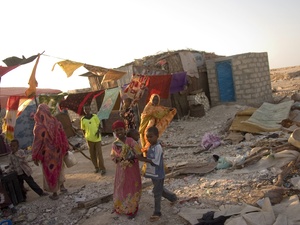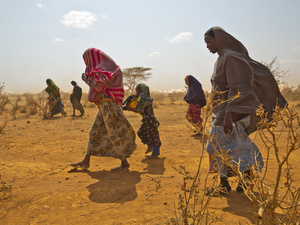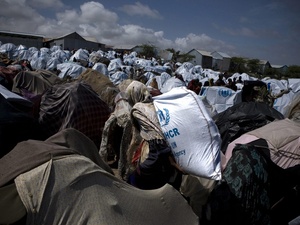Fighting forces more Somalis to flee Mogadishu
Fighting forces more Somalis to flee Mogadishu
We are gravely concerned about spiralling violence and the worsening displacement crisis in Somalia. Ongoing fighting between government forces and the opposition Al-Shabaab and Hisb-ul-Islam, which erupted on 7 May in several north-west areas of Somali capital Mogadishu, is leaving a trail of civilian casualties, destruction and renewed displacement.
According to records of local Somali hospitals, more than 250 civilians have been killed and at least 900 wounded since last month. We estimate that since the start of the fighting in May more than 160,000 people have been forced to leave their homes and seek shelter elsewhere within Somalia or in neighboring countries. Between 19 June and 22 June alone, an estimated 26,000 were displaced from Mogadishu due to heavy fighting.
The majority of the internally displaced people (IDPs), some 49,000, moved to the safer districts within the city or makeshift IDP settlements on the outskirts of Mogadishu, while another 45,000 fled towards the Afgooye corridor. They joined more than 400,000 IDPs who have been displaced since 2007. Others have gone to more distant locations including Lower and Middle Shebelle, Lower Juba, Galgaduud, and Gedo. According to our local partners, some of the displaced are heading towards neighbouring countries. Some of the newly displaced are families that had recently returned home following a period of relative peace in Mogadishu during the first four months of the year.
Many IDPs tell stories of hardship and suffering as they try to flee the embattled Somali capital. Most of the people are trying to leave the city on board minibuses carrying on average of 20 people. According to IDPs, drivers are charging US$ 250 or more for a fare. Our partners in Somalia spoke with some of them in Afmadow some 400 km south west of Mogadishu. One of these IDPs, a mother of six, told our partners it took her nine days to reach Afmadow as the local transporters took her money and then left her and her children stranded along the route.
The deteriorating security situation has sharply reduced deliveries of desperately needed humanitarian aid to the displaced in and around Mogadishu. Our local partners that have been providing a lifeline to the IDPs are facing growing security problems as they try to help the needy.
Meanwhile, in neighbouring Kenya, the number of refugee arrivals continues to rise. Since the beginning of the year, some 38,000 new refugees arrived in Kenya, virtually all of them Somalis. In June, the Dadaab camp received 4,104 refugees. Sheltering presently more than 280,000 people, Dadaab is the largest refugee complex in the world.












